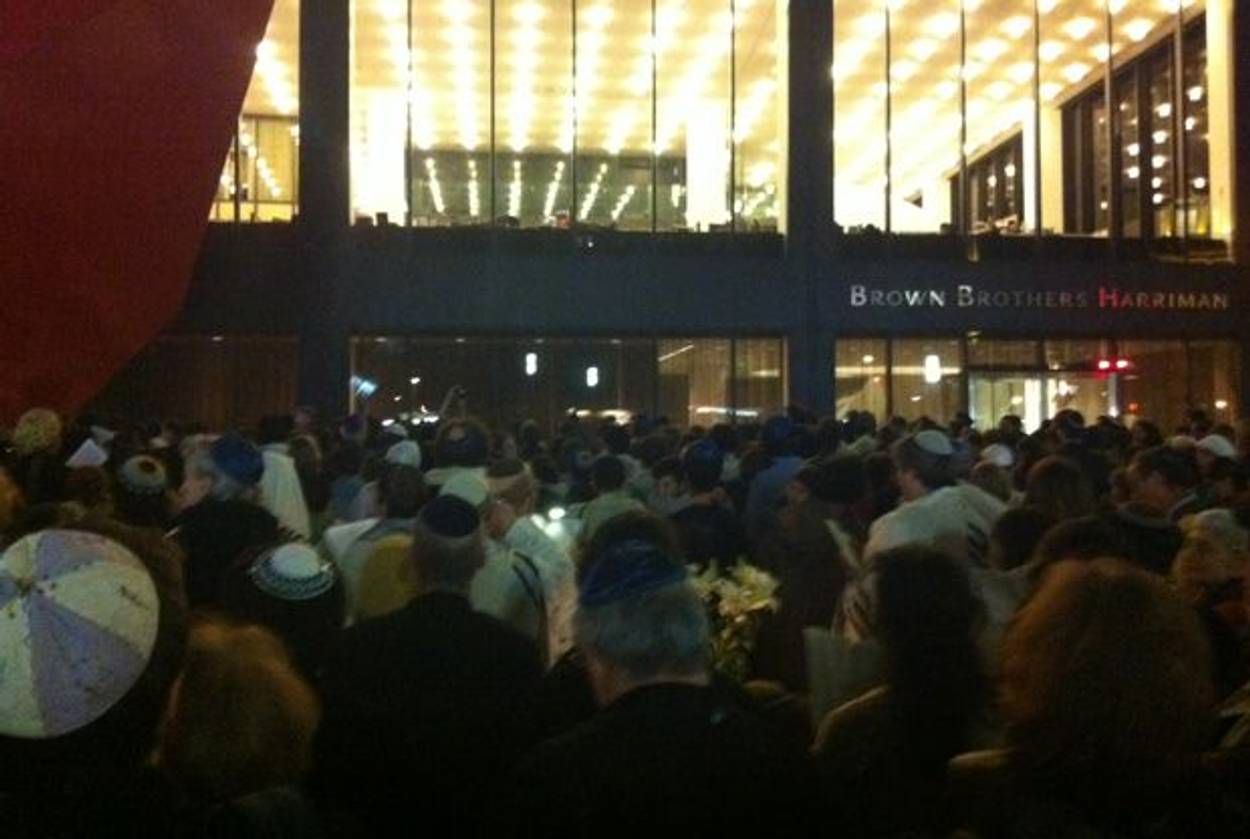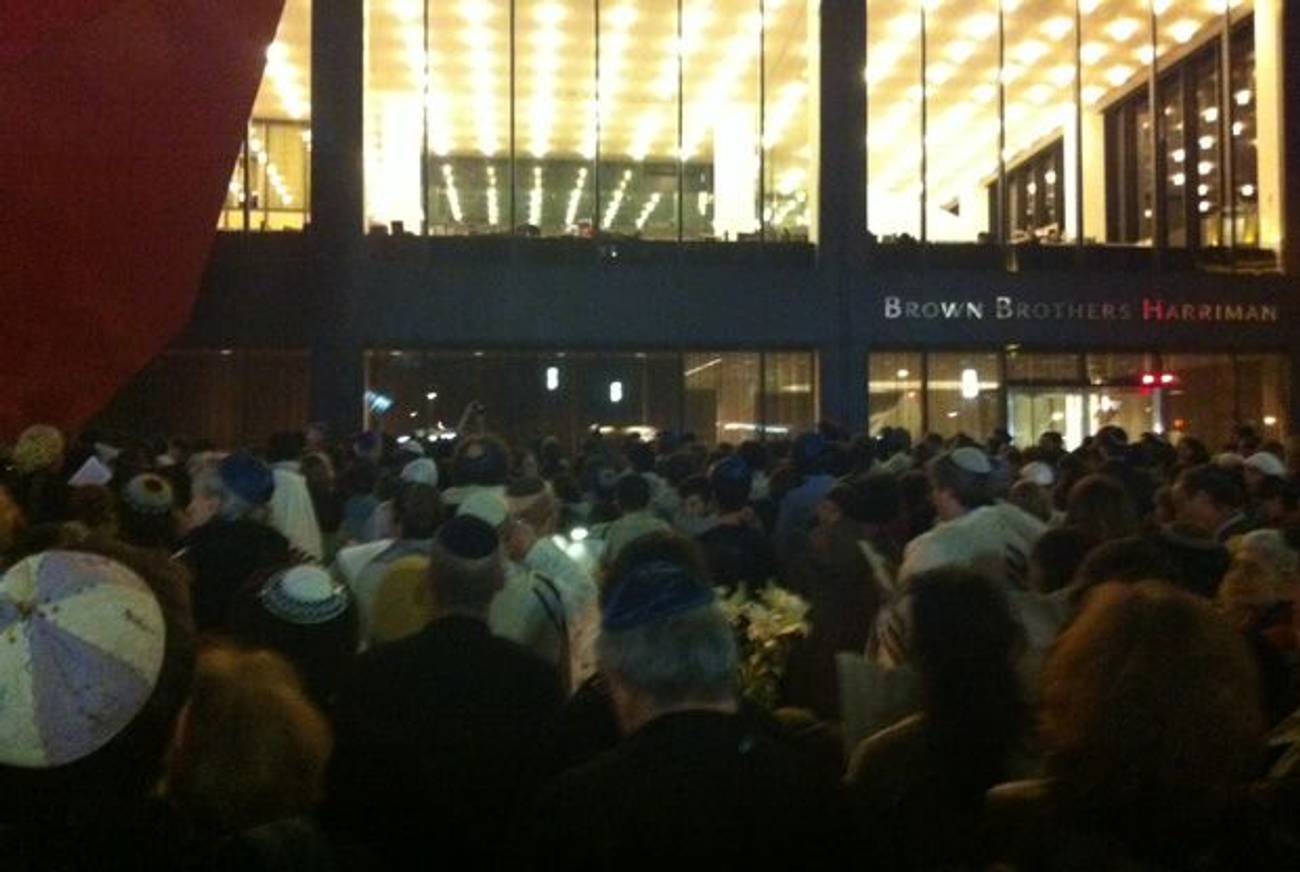Atonement in Lower Manhattan
An incredible Occupy Wall Street Kol Nidrei draws hundreds




Friday night, as the sun went down, hundreds of Jews gathered in an open square a few dozen yards from Zuccotti Park, where the Occupy Wall Street protest has taken place for the past three weeks. Led by a rabbinic intern, a chazzan, and a few others, and with no electronic amplification—the group relied, instead, on the old protest trick of forming concentric circles and having the outer layers repeat what the inner layers have said—the group davened the Kol Nidrei service. (Even Israel noticed!) The leaders sought to connect the service and its titular prayer, in which Jews ask God to release them from obligations made to Him, to the causes championed by the protesters across Broadway, whose drums and chants resounded during quiet moments, and who had been consulted beforehand. Like the protest, what emerged from this were undeniable left-wing sentiments deliberately muffled in order to maintain as large as possible a tent.
“Kol Nidrei reminds us that though we make commitments under duress, ultimately we are accountable only to the higher values of Justice and Righteousness,” Daniel Sieradski, a young Jewish writer and activist who organized the event, told the crowd, reciting a labor organizer’s midrash. (Right-wing critics would be correct to note that, if it were 100 years ago, Sieradski and the others would be inciting socialist riots on the Lower East Side; what they fail to see, here as elsewhere, is that it isn’t 100 years ago, and today you couldn’t find a minyan to form that riot.)
Today, we are thinking about a different kind of commitment made under duress. A big part of our financial crisis was caused by a banking system which misled and pressured, which up-sold and implored us to sign without reading, where fraud was rampant, and where caution was absent. Because of those external problems, many good hardworking people were steered, under a sort of duress, into financial doom while their futures were sold from the rich to the richer.
Today, as we think about how commitments must be contemplated in the context of right and wrong, of earth and heaven, we know that those notes have no moral weight, that banks can’t and shouldn’t own the futures of people who work, and that it’s time for the bankers to abandon their claims on everyday people’s futures. I will leave it to another [on this day] to think about what this means practically or what policies we should adopt as a country.
Note the clear values; note, also, the immediate disclaimer about how those values are to be implemented. (In yesterday’s New York Times, Tablet Magazine contributor Todd Gitlin expertly explored how far Occupy Wall Street’s essentially anarchist, policy-free plank has gotten them—and argues it won’t take them much further.)
I was lucky to have been there. Participating, politics took on an emotional poignancy they rarely do, and the spiritual issues we are commanded to think about during Yom Kippur—including those raised in the haftarah, from Isaiah, in which we are exhorted to think of what kind of fast God truly desires—were made as real and personal as my learning has told me they should be. Besides all of which, it was immensely moving to be a part of a group of Jews practicing our religion publicly and peaceably; I schepped naches from the organizers, who were very clearly putting hard-earned Jewish summer camp experience to good use; I felt like I was part of a community, in the way that the concept of the minyan is supposed to encourage.
Halal vendors dotted the outskirts, prompting one smart aleck to remark that we were their worst nightmare: several hundred Jews who weren’t eating. A couple onlookers claimed that the firm Brown Brothers Harriman, whose very tall building we all faced when looking east, had helped finance the Nazis, and that Bush’s grandfather had been a part of it. This cynic chalked the rambling up to dorm-room investigative journalism, until a quick Google revealed it to be totally true. Though I tend not to be one for crunchier variants of Judaism, the few moments of schmaltz were outweighed by the moral seriousness of the larger mission. And the politics should have been welcome to, let’s say, the open-minded. “I will be more accountable for Palestine. Aleinu,” was followed by, “I will be more accountable for Israel. Aleinu.” Afterward, a few folks pulled out instruments—a violin, a guitar—and there was dancing. “Early rabbinic texts call Yom Kippur one of the two happiest days of the year,” George Davis, our rabbi for the evening, told us. “What makes this day happy? It is the day of forgiveness.”
What seems undeniable is that the service, less than trying to advance a cause, was trying to be a cause. The organizers did not intend primarily to argue for a certain vision of society; they endeavored to be that society, in this instance an observant Jewish slice of it, in which members of all different denominations (Sieradski told me that from the chazzan to the machzorim, official Reconstructionist, Conservative, and Orthodox organs had all chipped in), political beliefs, and—emphasis here—classes and sexual orientations can come together to share in ancient ritual.
In this, the service was a perfect match for Occupy Wall Street itself, which to this point has been most successful in simply (to crib from Gandhi) being the change it wishes to see in the world rather than enacting it on a systemic level. A trip back to Lower Manhattan yesterday confirmed this. There is a fascinating, functioning mini-society in Zuccotti Park. There is a food line. There is a medical station, with a doctor on call. There is a newspaper (including a Spanish edition, a copy of which I proudly own). There are exhibits, almost as in a museum, showing new and better ways to live.
The politics yesterday remained focused on “occupying Wall Street”—calling to account a system that rewards the richest one percent with 40 percent of the country’s wealth and that allows financial tycoons who pay low tax rates and exploited the ignorance of the less-well-off to have prime membership in that top one percent. (Wall Street is responding: reportedly, JPMorgan Chase’s weekly email on the global economy was titled, “Tikkun Olam.”) Around 4, there was a rally led by clergy, and a rabbi got up and recited Isaiah on fasting. I saw a sign that read, “End the Occupations of Iraq and Afghanistan.” I saw anti-Obama signs; I saw pro-Obama signs. What was almost totally lacking were any of the things you worry about. I saw a sign that read, “Finally, an occupation a radical Jew can get behind,” and if you don’t see that as harmless, I fear how much must trouble your sleep. I saw a solitary guy spouting Che. Will he be joined by more? That would be very, very sad.
If only there were another Jewish celebration that could continue with the theme of benevolent occupation. Say, a holiday in which you build a makeshift house and eat and sleep in it.
What’s that you say? It starts Wednesday night?
Yes, folks, it’s true: I can confirm that Sieradski and friends will be building an Occupy Wall Street sukkah
Marc Tracy is a staff writer at The New Republic, and was previously a staff writer at Tablet. He tweets @marcatracy.